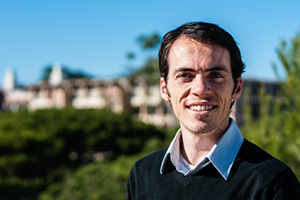Materials science and engineering assistant professor Taylor Sparks received a five-year NSF CAREER Award. The award is for his project of developing tools to more safely and effectively discover new materials that could be used to harvest wasted energy.
Typically, about 60 percent of energy used from things such as a laptop computer, cell phone or even power lines is wasted in the form of heat. “If you can recover even small amounts of that, there is tremendous potential for energy,” Sparks said.
So he and his team have partnered with a software development company to develop tools that can take huge amounts of data about all known materials and suggest the best sustainable thermoelectric compounds that can extract this wasted energy. The software company will develop the programs, while Taylor and his team will provide the database of materials and validate the software’s results.
“In essence it works like Netflix. If you watch season after season of ‘Battlestar Galactica’ or give it five stars, then it can suggest with high probability that you might also like ‘Star Trek: The Next Generation,’” he said about how the software would work. “Instead of picking random compositions out of a hat to discover new materials, we rely on computationally inexpensive statistical probabilities of thermoelectric performance to predict what new materials might be great performers, and then we go make them.”
By successfully coming up with compound materials that can absorb the heat and convert it to energy, these materials could be key to increasing the energy efficiency for any powered device.
Sparks earned his bachelor’s in materials science and engineering from the U in 2007, a master’s in materials from the University of California, Santa Barbara, and a doctorate in applied physics from Harvard University.

